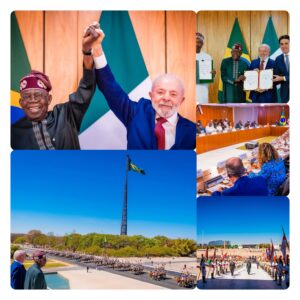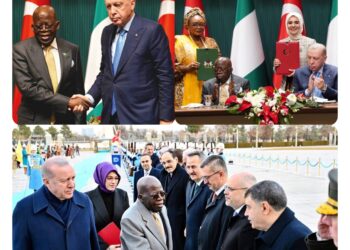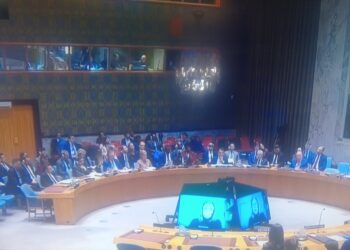From Lagos to São Paulo: How Tinubu and Lula Are Re-Shaping South–South Cooperation in Aviation, Agriculture, Energy, and Innovation

By Ibrahim Kegbegbe
When President Bola Ahmed Tinubu stepped into the grandeur of Brazil’s Itamaraty Palace this August, the symbolism was rich, but the substance was even greater. In a world where geopolitical fault lines are shifting, his state visit to President Luiz Inácio Lula da Silva marked not only a rekindling of Nigeria–Brazil relations, but also a bold case study in how nations of the Global South can chart their own path to prosperity.
Five Memoranda of Understanding—spanning trade, aviation, science, finance, and diplomacy—were signed. But beneath these broad categories lie four key pillars that could transform how Africa and Latin America engage with each other and with the wider world: aviation, agriculture, energy, and innovation.
Aviation: Shortening the Distance Between Continents
For decades, Nigeria and Brazil have been close in spirit but far in travel. That gap is about to shrink. Nigeria’s flag carrier, Air Peace, is preparing to launch direct flights between Lagos and São Paulo. For businesses, this is more than convenience—it is a logistical revolution. Direct air links mean reduced transaction costs, faster delivery of goods, and new opportunities in tourism, education, and cultural exchange.
Equally significant is the agreement with Embraer, Brazil’s aviation giant, to establish a regional maintenance and service hub in Nigeria. For a continent where airlines often suffer from high operating costs due to offshore servicing, this is transformative. It positions Nigeria as a future aviation hub for West Africa, connecting African skies more seamlessly with Latin America and beyond.
Agriculture: Feeding Nations Through Shared Knowledge
Brazil has long been a global model in agricultural innovation, turning once-impoverished regions like the Cerrado into breadbaskets through mechanization and research. Nigeria, with over 34 million hectares of arable land but under-mechanized farming practices, has much to gain.
Earlier this year, Nigeria and Brazil inked a $1 billion mechanization agreement, laying the foundation for tractors, harvesters, and modern technology to reach smallholder farmers across Nigerian states. This is not merely about food production—it is about food sovereignty. In a century where climate shocks and supply disruptions are reshaping global food systems, South–South agricultural cooperation provides a buffer against dependency on Northern imports.
Internationally, this resonates with countries in Asia and Latin America facing similar challenges: how to scale farming sustainably while preserving ecosystems and empowering rural economies. Nigeria’s partnership with Brazil could emerge as a replicable model across the Global South.
READ ALSO:Aunty Sidi, Harcher: Humility Meets Stardom
Energy: Petrobras and the Promise of Shared Prosperity
One of the most headline-grabbing developments was the prospect of Petrobras’s return to Nigeria. The Brazilian energy giant once played a pivotal role in Nigeria’s oil and gas sector before withdrawing in 2018. Its renewed interest, against the backdrop of Nigeria’s energy reforms and liberalized forex market, signals confidence in the country’s stability and resource potential.
But this is not just about oil. With the global transition to cleaner fuels, Nigeria and Brazil—two nations with vast reserves of natural gas, deep biofuel expertise, and growing investments in renewables—have a chance to jointly shape the future of sustainable energy. A collaboration in gas infrastructure, ethanol technologies, and clean energy research could redefine the narrative of fossil-fuel-dependent economies adapting to a low-carbon world.
This matters internationally because energy security is a global concern. If Africa and Latin America can harness their resources responsibly while accelerating renewable adoption, they can provide a counterweight to the energy dominance of the Middle East and Eurasia.
Innovation: A South–South Knowledge Highway
Perhaps the most forward-looking dimension of Tinubu’s Brazil visit is the focus on science and innovation. Agreements covered areas such as biotechnology, digital transformation, bioeconomy, and ocean science. These are not sectors of tomorrow—they are the cutting edge of today’s global economy.
Nigeria, with its booming youth population and growing tech ecosystem (from Lagos’s “Yabacon Valley” to Abuja’s innovation hubs), stands to benefit from Brazil’s decades of research capacity in pharmaceuticals, genetic science, and digital governance. A partnership that links Nigerian ingenuity with Brazilian expertise could create a knowledge highway across the Atlantic—fueling startups, manufacturing, and homegrown solutions for the challenges of the Global South.
International observers should note: this is about shifting from being mere consumers of Northern technology to becoming co-producers of global innovation.
A Shared Horizon for the Global South
What makes Tinubu’s visit extraordinary is not just the agreements signed, but the broader philosophy of partnership it represents. Brazil and Nigeria are both regional giants—one in Africa, the other in Latin America. Together, they are sketching a blueprint for South–South cooperation that challenges outdated hierarchies of dependency.
For international readers in Europe, Asia, and North America, the message is clear: the Global South is no longer waiting to be invited into global decision-making. It is building its own bridges, charting its own skies, feeding its own people, and innovating on its own terms.
Tinubu closed his visit with gratitude for the friendship, the feijoada, and the sense of shared destiny. But beyond the warm gestures, what endures is the vision: a transatlantic partnership rooted in action, not rhetoric; in shared prosperity, not dependency.
















